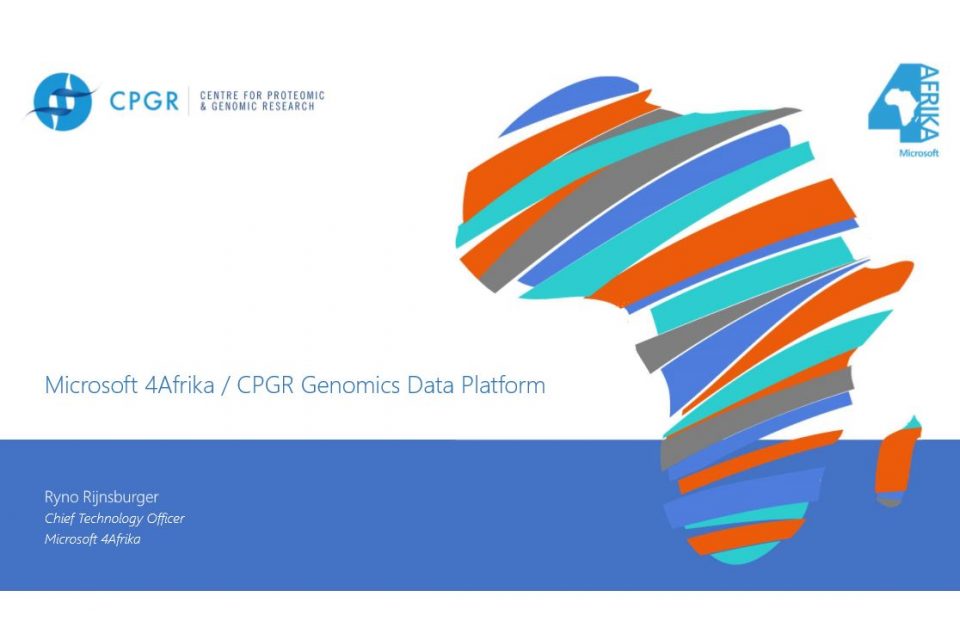30 October 2018, Cape Town – Microsoft, through its 4Afrika initiative, and the Centre for Proteomic & Genomic Research (CPGR) have embarked on a joint project bringing together the intelligent cloud and genomics research to create a scalable, cost-effective technology platform to power advanced medical analysis and research. This platform will be enabled by Microsoft Azure – to support the data transfer, storage and processing capabilities for genomics datasets – and will allow African scientists and academics to perform and collaborate on ground-breaking genomics research.
The project aims to make genomic applications (such as, non-invasive prenatal testing (NIPT), BRCA sequencing for breast cancer, HLA typing for stem cell match making and ancestry profiling) available on an accessible, secure and versatile cloud-based platform.
It is the first such initiative in Africa and could have enormous social and health care provision benefits, including avoiding prescription of ineffective drugs and sidestepping potential side effects, as well as enhancing the analysis of data, the dissemination of information and the aggregation of data to support regional genomic research, innovation and health provision.
“Working with Microsoft Azure gives us an opportunity to explore data management solutions that are flexible in scope and scale when supporting large-scale research projects or developing precision medicine solutions,” says Reinhard Hiller, managing director at CPGR.
Partnering for health
Based in Cape Town, the CPGR provides advanced ‘omics’ services to the life science and biotech communities in South Africa. ‘Omics’ groups, together with several specialities within the field of biology – including proteomics and genomics, which ‘zoom in’ on the proteome (the proteins output of an organism) and genome (the genetic makeup of an organism) respectively. This non-profit organisation uses leading technologies and bio-computational data pipelines to create and support tailored services for both academia and industry customers alike.
A universe of data within us
Arguably the most famous of omics projects – to a broader, non-specialist audience – was the Human Genome Project which set out to map the entire human genome. This ambitious inward journey of discovery took 15 years to be declared ‘complete’ and uncovered, among other things, that the length of the average human genome – measured in base pairs (letters of the DNA sequence) – is approximately three billion. If we think of this as kilobytes of data, we’re talking about three terabytes of data points to be unpacked and explored per person.
To analyse this amount of information, a robust technology platform for analytics is needed, and so the need for a partnership such as this becomes more apparent. Combined with the power and stability of Azure (Microsoft’s dynamic cloud computing service) and coupled with technical and financial support from Microsoft 4Afrika, this project will boost the depth and breadth of the African medical sciences research community’s output and nurture the establishment of a stronger and sustainable African medical research community.

From data to utility
“The project allows us to use an existing cloud-based data management ecosystem, while amplifying our own expertise in developing and running a genomics technology platform. We envisage creating a system that allows us to deliver value, and collaborate with others across the continent,” says Hiller.
In this way, the platform aims to counter the often-incomplete access to cutting-edge medical solutions for many people in Africa. The platform will:
- enhance access to patient eco-systems;
- ease collection and transfer of information;
- support the processing and down-stream analysis of genomic (e.g. DNA sequencing) data;
- allow for the secure, efficient and safe aggregation of such data; and
- provide a means to combine and mine such data for research purposes.
Common diseases, such as cancer or diabetes, are influenced by the interplay of many different genetic markers. To study these linkages requires the aggregation and analysis of very large datasets. In addition, provision of gene-based diagnostic testing requires the careful comparison of an individual patient’s data with appropriate reference data sets. Given the rapidly expanding nature of biomedical science and the genetic diversity found in African populations, having a means to store and analyse data is a key pillar of Africa-led research and innovation. Such a solution will aid in reducing “data drain” from Africa as researchers will have solutions to better manage and analyse their data.
Microsoft for medicine
This project speaks directly to the potential of cloud technologies in enabling cutting-edge science and medicine. With a scalable platform like Azure as the backbone of a project, medical researchers can get to work on unlocking the secrets embedded in our cells – a giant leap for mankind into ‘inner space’ – and towards a better, healthier life.
“For Microsoft 4Afrika, it is one of the most exciting fruits of our long-term investment into Africa’s economic, social and technological development,” says Ryno Rijnsburger, chief technology officer at Microsoft 4Afrika. “We are providing both financial and technical support to the CPGR and also intend to bring out Microsoft experts to work with the team through our MySkills4Afrika volunteer programme.”
“Another of the intended outcomes is to stimulate interest and support the CPGR in accessing additional funding to continue operationalising the platform, which will in turn lead to additional technology investments into things like mobile apps and reporting capabilities.”
“The sheer volume of data that can flow through the system will drive genomic research and medical innovation, and public health across Africa will reap the benefits,” concludes Rijnsburger.







